
Ankle sprains can result in various symptoms that require attention, especially if the injury is severe. Typically, those individuals with a sprained ankle will experience sharp, localized pain that worsens with joint movement or when bearing weight on the affected foot. This pain often coincides with noticeable swelling, which may be more pronounced, depending on which ligament is injured. Bruising surrounding the sprain site is common, with discoloration ranging from reddish to purplish hues. These signs indicate torn ligaments and the presence of blood pooling in the area. In severe cases, individuals might hear or feel a pop at the time of injury, signaling a significant tear. This can also result in a restricted range of motion, making it difficult or even impossible to flex or move the foot normally. If you have severe ankle pain, it is suggested that you make an emergency appointment with a podiatrist for a diagnosis and treatment options.
Although ankle sprains are common, they aren’t always minor injuries. If you need your ankle injury looked at, contact Brent Harwood, DPM from Southeast Podiatry. Our doctor can provide the care you need to keep you pain-free and on your feet.
How Does an Ankle Sprain Occur?
Ankle sprains are the result of a tear in the ligaments within the ankle. These injuries may happen when you make a rapid shifting movement while your foot is planted. A less common way to sprain your ankle is when your ankle rolls inward while your foot turns outward.
What Are the Symptoms?
Preventing a Sprain
Treatment of a Sprain
In many cases, the RICE method (Rest, Ice, Compression, and Elevate) is used to treat ankle sprains. However, you should see a podiatrist to see which treatment option would work best with your injury. In severe cases, surgery may be required.
It is important to ask your doctor about rehab options after you receive treatment for your injury. Stretching, strength training, and balance exercises may help the ankle heal while also preventing further injury.
If you have any questions, please feel free to contact one of our offices located in Fairhope, Brewton, and Atmore, AL . We offer the newest diagnostic and treatment technologies for all your foot care needs.
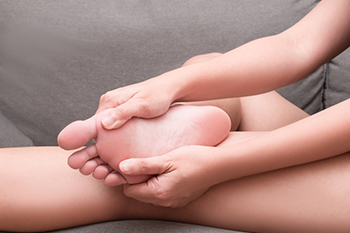
Sesamoiditis is an inflammation of the sesamoid bones, which are two small, pea-shaped bones located beneath the big toe joint. These bones are embedded within tendons and play a vital role in absorbing weight-bearing pressure and reducing friction. They also assist with the movement of the big toe during activities like walking and running. Sesamoiditis often occurs in people who engage in activities that put repetitive stress on the ball of the foot, including dancers, runners, and athletes. It can also develop in people with high arches or who frequently wear high heels. Symptoms of sesamoiditis include pain and tenderness beneath the big toe, which typically worsens with activity and improves with rest. To manage sesamoiditis, it is important to reduce pressure on the affected area by wearing cushioned shoes or using orthotic inserts. Rest and anti-inflammatory medications can help to alleviate pain. If symptoms persist, it is suggested that you consult a podiatrist for a proper diagnosis and treatment.
Sesamoiditis is an unpleasant foot condition characterized by pain in the balls of the feet. If you think you’re struggling with sesamoiditis, contact Brent Harwood, DPM of Southeast Podiatry. Our doctor will treat your condition thoroughly and effectively.
Sesamoiditis
Sesamoiditis is a condition of the foot that affects the ball of the foot. It is more common in younger people than it is in older people. It can also occur with people who have begun a new exercise program, since their bodies are adjusting to the new physical regimen. Pain may also be caused by the inflammation of tendons surrounding the bones. It is important to seek treatment in its early stages because if you ignore the pain, this condition can lead to more serious problems such as severe irritation and bone fractures.
Causes of Sesamoiditis
Treatment for sesamoiditis is non-invasive and simple. Doctors may recommend a strict rest period where the patient forgoes most physical activity. This will help give the patient time to heal their feet through limited activity. For serious cases, it is best to speak with your doctor to determine a treatment option that will help your specific needs.
If you have any questions please feel free to contact one of our offices located in Fairhope, Brewton, and Atmore, AL . We offer the newest diagnostic and treatment technologies for all your foot and ankle needs.
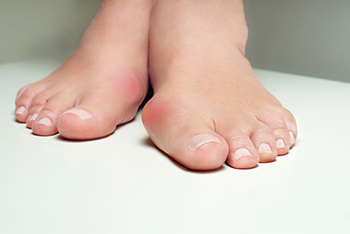
Bunions, characterized by a bony bump on the side of the big toe, are often caused by genetic factors, wearing ill-fitting shoes, or excessive foot pressure. The condition arises when the big toe deviates towards the second toe, leading to a misalignment at the joint. Symptoms typically include pain, swelling, and redness surrounding the affected area, along with difficulty in finding comfortable shoes. To manage bunions, it is essential to wear properly fitting shoes with ample room for the toes and avoid high heels. In cases of severe discomfort or worsening deformity, consulting a podiatrist to talk about potential surgical options may be necessary. If you have developed a bunion, it is suggested that you are under the care of this type of doctor who can guide you toward the necessary treatment methods.
If you are suffering from bunions, contact Brent Harwood, DPM of Southeast Podiatry. Our doctor can provide the care you need to keep you pain-free and on your feet.
What Is a Bunion?
A bunion is formed of swollen tissue or an enlargement of boney growth, usually located at the base joint of the toe that connects to the foot. The swelling occurs due to the bones in the big toe shifting inward, which impacts the other toes of the foot. This causes the area around the base of the big toe to become inflamed and painful.
Why Do Bunions Form?
Genetics – Susceptibility to bunions are often hereditary
Stress on the feet – Poorly fitted and uncomfortable footwear that places stress on feet, such as heels, can worsen existing bunions
How Are Bunions Diagnosed?
Doctors often perform two tests – blood tests and x-rays – when trying to diagnose bunions, especially in the early stages of development. Blood tests help determine if the foot pain is being caused by something else, such as arthritis, while x-rays provide a clear picture of your bone structure to your doctor.
How Are Bunions Treated?
If you have any questions, please feel free to contact one of our offices located in Fairhope, Brewton, and Atmore, AL . We offer the newest diagnostic and treatment technologies for all your foot care needs.
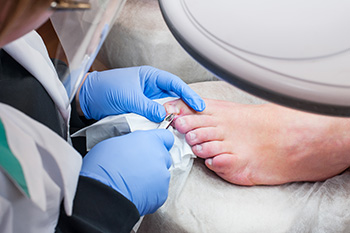
When home treatments fail to alleviate the pain and discomfort of an ingrown toenail, surgical intervention may become necessary. A podiatrist plays an essential role in diagnosing the severity of the ingrown toenail and recommending the most suitable treatment. Surgery for ingrown toenails is generally reserved for severe cases, especially if there's an infection or if the individual has a condition, like diabetes, that complicates healing. One common surgical procedure is the wedge resection, where a portion of the toenail is removed to prevent it from growing into the skin. In more extreme cases, a total toenail removal might be performed, which involves the complete removal of the nail to prevent recurrence. Another option, matrixectomy, involves the removal of the nail bed to stop future nail growth altogether. These procedures are typically performed under local anesthesia, allowing for quick recovery. After ingrown toenail surgery, maintaining a clean and dry wound is essential to prevent infection. If you have an ingrown toenail that is causing extreme pain, it is suggested that you make an appointment with a podiatrist to find out if surgery is needed.
Ingrown toenails can become painful if they are not treated properly. For more information about ingrown toenails, contact Brent Harwood, DPM of Southeast Podiatry. Our doctor can provide the care you need to keep you pain-free and on your feet.
Ingrown Toenails
Ingrown toenails occur when a toenail grows sideways into the bed of the nail, causing pain, swelling, and possibly infection.
Causes
Prevention
Because ingrown toenails are not something found outside of shoe-wearing cultures, going barefoot as often as possible will decrease the likeliness of developing ingrown toenails. Wearing proper fitting shoes and using proper cutting techniques will also help decrease your risk of developing ingrown toenails.
Treatment
Ingrown toenails are a very treatable foot condition. In minor cases, soaking the affected area in salt or antibacterial soaps will not only help with the ingrown nail itself, but also help prevent any infections from occurring. In more severe cases, surgery is an option. In either case, speaking to your podiatrist about this condition will help you get a better understanding of specific treatment options that are right for you.
If you have any questions please feel free to contact one of our offices located in Fairhope, Brewton, and Atmore, AL . We offer the newest diagnostic and treatment technologies for all your foot and ankle needs.
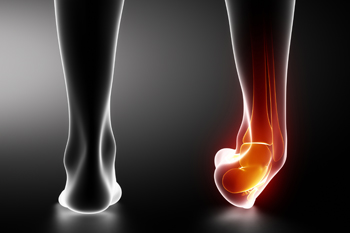
Ankle dislocations are serious injuries where the bones in this complex joint lose their proper alignment. An ankle dislocation usually involves the shin bone, or tibia, and the foot bone, or talus, coming apart. Often, this injury is accompanied by breaks in the lower parts of the shin bones and damage to the ligaments that keep the ankle stable. In rare cases, just the ligaments can be injured, causing dislocation. These injuries are typically caused by trauma such as falls, car accidents, or sports injuries. The direction of dislocation depends on how the foot is positioned and the force applied. For example, when the foot points downward, the ankle might dislocate backwards. Twisting injuries can cause the ankle to dislocate sideways. Dislocations are very painful. They often cause visible deformity, swelling, bruising, and possible numbness or tingling if nerves are affected. Standing or walking is often impossible. If you believe your ankle may be dislocated, it is suggested that you make an emergency appointment with a podiatrist for an exam and treatment.
Ankle pain can be caused by a number of problems and may be potentially serious. If you have ankle pain, consult with Brent Harwood, DPM from Southeast Podiatry. Our doctor will assess your condition and provide you with quality foot and ankle treatment.
Ankle pain is any condition that causes pain in the ankle. Due to the fact that the ankle consists of tendons, muscles, bones, and ligaments, ankle pain can come from a number of different conditions.
Causes
The most common causes of ankle pain include:
Symptoms
Symptoms of ankle injury vary based upon the condition. Pain may include general pain and discomfort, swelling, aching, redness, bruising, burning or stabbing sensations, and/or loss of sensation.
Diagnosis
Due to the wide variety of potential causes of ankle pain, podiatrists will utilize a number of different methods to properly diagnose ankle pain. This can include asking for personal and family medical histories and of any recent injuries. Further diagnosis may include sensation tests, a physical examination, and potentially x-rays or other imaging tests.
Treatment
Just as the range of causes varies widely, so do treatments. Some more common treatments are rest, ice packs, keeping pressure off the foot, orthotics and braces, medication for inflammation and pain, and surgery.
If you have any questions, please feel free to contact one of our offices located in Fairhope, Brewton, and Atmore, AL . We offer the newest diagnostic and treatment technologies for all your foot care needs.
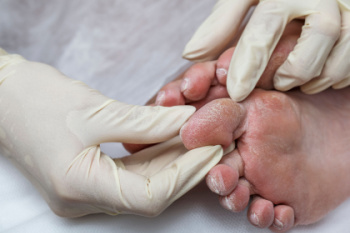 Diabetes can lead to various foot problems caused by poor blood circulation and nerve damage, known as diabetic neuropathy. This condition reduces the ability to feel pain or temperature changes, increasing the risk of unnoticed injuries, blisters, or sores. Poor circulation also slows down the healing process, making minor foot issues more likely to develop into serious infections or ulcers. A routine foot care plan is essential for individuals with diabetes. This includes daily inspection of the feet for cuts, blisters, redness, or swelling, and keeping the feet clean and moisturized to prevent dry, cracked skin. Wearing well-fitting shoes and changing socks daily can help to prevent irritation and injury. Regularly trimming toenails and avoiding walking barefoot are also important preventive measures. If foot problems arise, such as persistent pain, swelling, or wounds that do not heal, it is strongly suggested that you visit a podiatrist immediately. This foot doctor can provide specialized care, help prevent complications, and develop a comprehensive foot care strategy to maintain foot health.
Diabetes can lead to various foot problems caused by poor blood circulation and nerve damage, known as diabetic neuropathy. This condition reduces the ability to feel pain or temperature changes, increasing the risk of unnoticed injuries, blisters, or sores. Poor circulation also slows down the healing process, making minor foot issues more likely to develop into serious infections or ulcers. A routine foot care plan is essential for individuals with diabetes. This includes daily inspection of the feet for cuts, blisters, redness, or swelling, and keeping the feet clean and moisturized to prevent dry, cracked skin. Wearing well-fitting shoes and changing socks daily can help to prevent irritation and injury. Regularly trimming toenails and avoiding walking barefoot are also important preventive measures. If foot problems arise, such as persistent pain, swelling, or wounds that do not heal, it is strongly suggested that you visit a podiatrist immediately. This foot doctor can provide specialized care, help prevent complications, and develop a comprehensive foot care strategy to maintain foot health.
Diabetic foot care is important in preventing foot ailments such as ulcers. If you are suffering from diabetes or have any other concerns about your feet, contact Brent Harwood, DPM from Southeast Podiatry. Our doctor can provide the care you need to keep you pain-free and on your feet.
Diabetic Foot Care
Diabetes affects millions of people every year. The condition can damage blood vessels in many parts of the body, especially the feet. Because of this, taking care of your feet is essential if you have diabetes, and having a podiatrist help monitor your foot health is highly recommended.
The Importance of Caring for Your Feet
Patients with diabetes should have their doctor monitor their blood levels, as blood sugar levels play such a huge role in diabetic care. Monitoring these levels on a regular basis is highly advised.
It is always best to inform your healthcare professional of any concerns you may have regarding your feet, especially for diabetic patients. Early treatment and routine foot examinations are keys to maintaining proper health, especially because severe complications can arise if proper treatment is not applied.
If you have any questions please feel free to contact one of our offices located in Fairhope, Brewton, and Atmore, AL . We offer the newest diagnostic and treatment technologies for all your foot and ankle needs.